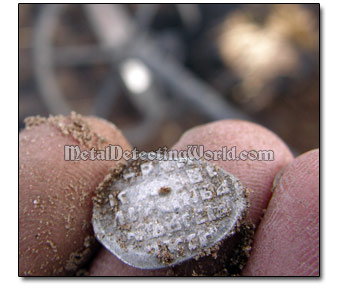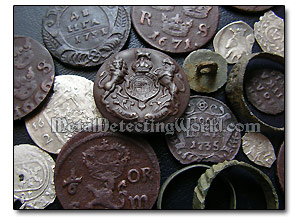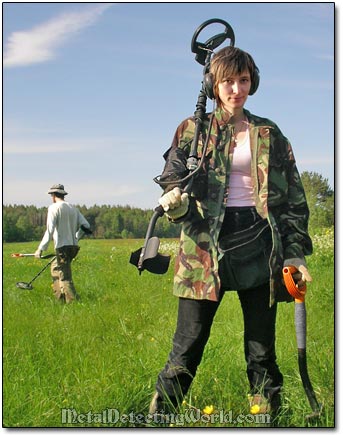A Complete Guide to Metal Detecting Activities, page 1
Descriptions, Info, Tips, and Accessories and Metal Detectors Required for Each Activity
Here you can find the short descriptions of metal detecting activities and types of metal detectors required for each activity. This information is to help you find "your cup of tea" in this hobby. Your making the right choice should depend on geographical, topographical and historical specifics of the area you live in.

TABLE of Contents:
- General Metal Detecting - page 1
- Coin Shooting - page 2
- Relic Hunting - page 4
- WW2 Military Relic Hunting - page 6
- Cache Hunting - page 9
- Beach/Shallow Surf Hunting - page 13
- Dry Sand Beach Hunting - page 16
- Wet Sand Beach Hunting - page 19
- Underwater Metal Detecting - page 23
- Snorkeling with a Metal Detector - page 23
- Scuba Metal Detecting - page 25
- Shipwreck Diving - page 26
- Gold Nugget Hunting/Prospecting - page 32
- Meteorite Hunting - page 35
1) GENERAL METAL DETECTING
General metal detecting evolves around searching for coins, buttons, jewelry, personal items and small to medium size iron relics (small household items, fragments of tools and weapons with developed Halo Effect) - all the common finds, which can be recovered at the sites of homesteads, parks, fields, ghost towns, etc. You can find the list of all locations for general metal detecting here.
Basic metal detecting and target recovery techniques are usually explained in the instruction manuals for metal detectors. You can find more information and tips on metal detecting in these sections:
How To Metal Detect
and
Target Pinpointing Techniques
as well as in many other sections of this web site.

Types of Metal Detectors Required:
Any conventional VLF/TR land metal detector will do the job. Of course, the more expensive a metal detector you use, the higher the variety of finds you may unearth.The most expensive (not always the most advanced) metal detectors are usually of the 'Turn-On-and-Go' type, i.e. they do not require any manual Ground Balancing (special tuning to the current ground mineralization) before you start metal detecting. This is possible because these detectors have one or two of the following modes of operation incorporated into their circuitries: Automatic Ground Balance, Auto Tune and/or Semi-Automatic Sensitivity.
These convenient and time-saving features allow you to metal detect without frequent manual ground balancing (optimal reduction of interference that comes from the ground mineralization) of your detector, dealing with hot rocks, and struggling with false signals when the soil's mineral content is high.
Necessary Detector's Features, Equipment and Accessories:
• Discrimination control is a must
• Automatic or Manual Ground Balance, or both (ideal case)
• Round DD (Double D) search coils 8 to 9 inches in diameter, elliptical search coils of medium size are preferable. Search coils of different sizes should be used according to your search techniques and/or metal detecting conditions: smaller coils - for metal detecting sites with a high concentration of trash, larger coils - for sites with low junk concentration. To learn about search coils of different types and sizes, their advantages and disadvantages, applications and secrets, visit my "Search Coils Secrets and Tips" page.
• Headphones are required for being able to hear deep "tiny" signals, and not to attract attention of passerby's or annoy them.
• Digging Tools may range from plastic trowels to full-size treasure hunting shovels made of special steel.
• Hand-Held Electronic Probes/Pinpointers are very helpful in fast locating of detected objects inside the dug holes during recovery in sandy or extremely dry soil. You may want to visit "Electronic Pinpointers Reviews" page to look at different brands. Sometimes it is impossible to keep the dirt plug intact and use the Plug-Splitting Technique if the ground is not moist.
• 3-Compartment Pouch is used to keep your "keeper" finds - coins, buttons, relics and junk separately. The pouch should be waterproof to prevent soiling your clothes and sturdy enough to hold plenty of weight. No trash should be left behind!
• Kneepads (at least one) are recommended.
• Sturdy Light Gloves will protect your hands from accidental cutting by broken glass, sharp fragments of rusty sheet iron, rusty nails, etc.

If you would like to read my stories in relation to general metal detecting in different parts of the world, please visit My Metal Detecting Stories page.